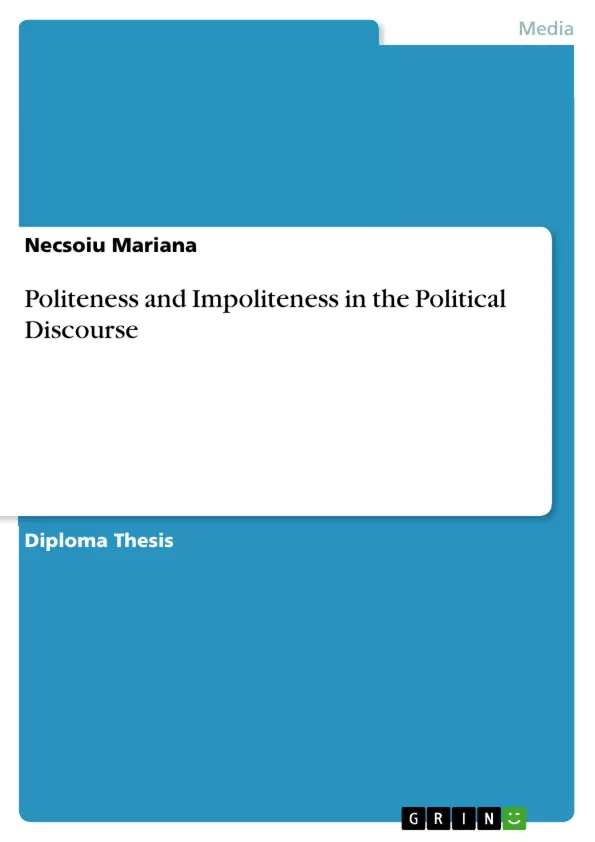The study focuses on communicative behaviour in Political Discourse, having in view the presence of elements of politeness and impoliteness. Political settings consist of rich and interesting elements of politeness and impoliteness. In order to achieve certain goals, politicians use politeness strategies. Nevertheless, impoliteness is salient when it occurs. In analyzing the data, some elements that trigger impoliteness will be followed.
Studies on politeness and impoliteness have acquired great popularity over the past few decades. However, they mostly emphasize the informal aspects of language. Politeness is conceptualized as strategic conflict avoidance. On the contrary, impoliteness is regarded as a violation of politic behaviour. Politeness and impoliteness are basic to any form of communication. The concepts of politeness and impoliteness play an important role in all kinds of discourses. One is Political Discourse.
Inhaltsverzeichnis (Table of Contents)
- Argument
- Chapter I. THEORETICAL BACKGROUND
- I.1. Politeness
- I.2. Impoliteness
- Chapter II. POLITENESS AND IMPOLITENESS IN POLITICAL DISCOURSE
- II.1. Objectives of the study
- II.2. Research Methodology
- II.3. Data collection and analysis
- Conclusions
- Bibliography
Zielsetzung und Themenschwerpunkte (Objectives and Key Themes)
This dissertation examines politeness and impoliteness in political discourse. The study aims to explore how these concepts manifest in political communication and to analyze the strategies employed by politicians to achieve their communicative goals.
- The nature and significance of politeness and impoliteness in communication
- The application of politeness and impoliteness strategies in political discourse
- The role of face-threatening acts and power dynamics in shaping political communication
- The cultural and contextual influences on politeness and impoliteness in political settings
- The potential for impoliteness to serve strategic purposes in political communication
Zusammenfassung der Kapitel (Chapter Summaries)
Chapter I provides a theoretical background on politeness and impoliteness, drawing on key scholars in the field such as Goffman and Brown & Levinson. The chapter explores different perspectives on politeness as a linguistic tool, highlighting its role in minimizing conflict and fostering social interaction. It also delves into the concept of face and how it relates to politeness strategies.
Chapter II focuses on the application of politeness and impoliteness in political discourse. This chapter examines the objectives of the study, the research methodology employed, and the process of data collection and analysis. It analyzes the strategies used by politicians to achieve their goals, including the use of politeness to avoid conflict and the strategic deployment of impoliteness.
Schlüsselwörter (Keywords)
The key concepts explored in this dissertation include politeness, impoliteness, political discourse, face-threatening acts, power dynamics, communicative strategies, and cultural influences. The study aims to provide insights into the complex interplay of these concepts in shaping political communication.
- Citation du texte
- Necsoiu Mariana (Auteur), 2021, Politeness and Impoliteness in the Political Discourse, Munich, GRIN Verlag, https://www.grin.com/document/1158424



